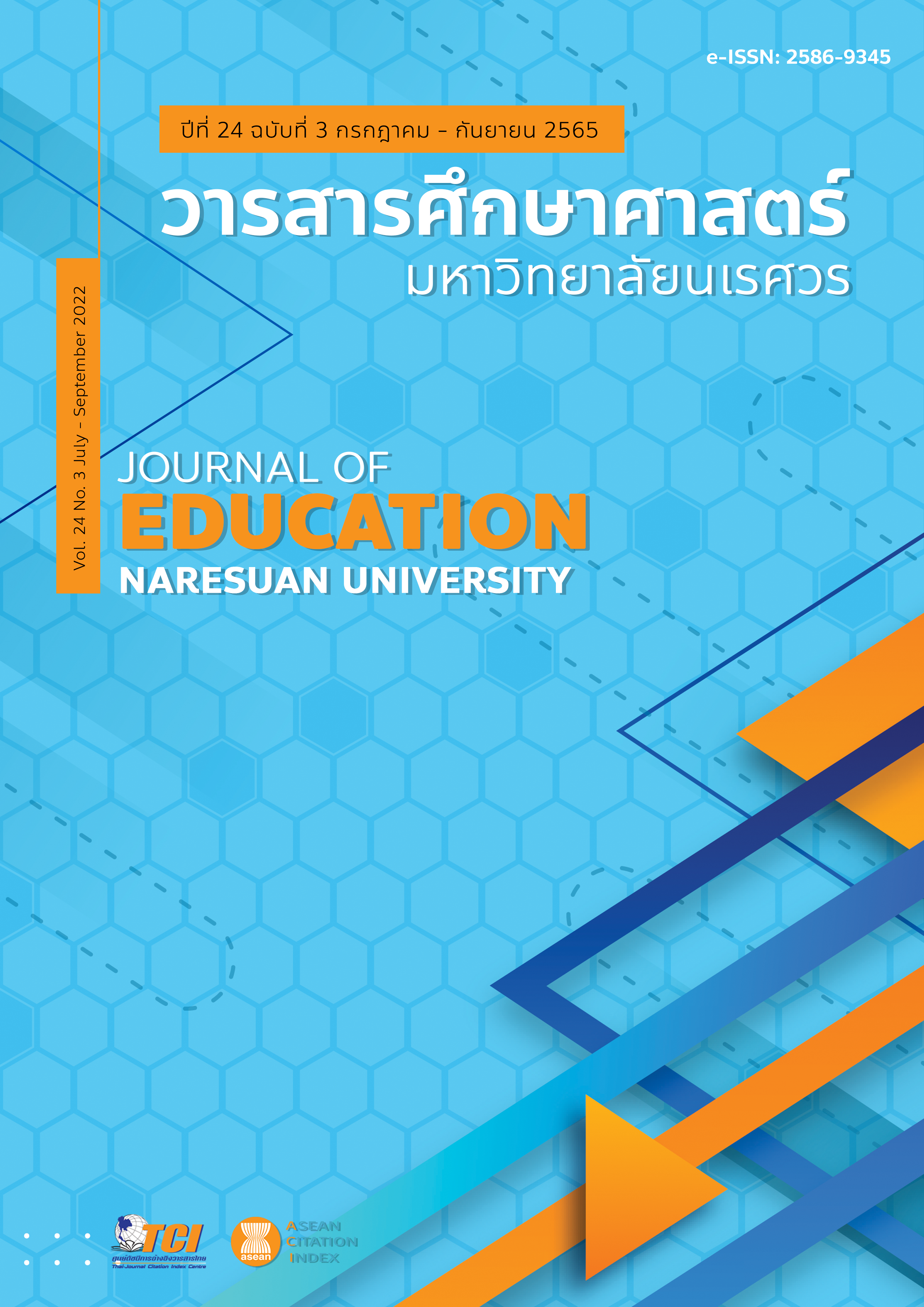EFFECTS OF PROGRAM TO PROMOTE CHALLENGE-SEEKING IN LEARNING ENGLISH LANGUAGE BASED ON THE MINDSET THEORY OF UNDERGRADUATE STUDENTS ผลของโปรแกรมส่งเสริมการแสวงหาความท้าทายในการเรียนรู้ภาษาอังกฤษตามทฤษฎีกรอบความคิดของนักศึกษาระดับปริญญาบัณฑิต
Main Article Content
Abstract
The purposes of this research were to examine the effect of the program to promote challenge-seeking in learning English Language based on the mindset theory of undergraduate students. The participants of this study consisted of 39 fourth years students from a private university in Bangkok, consisting of 19 experimental group students and 20 control group students. The Instruments included a program to promote challenge -seeking in learning English Language based on the mindset theory. The training program contained six periods with 75 minutes in each period for three weeks and the challenge- seeking in learning English language scale. The data collection consisted of pretest and posttest phases and the data were analyzed by T- Test. The findings were 1) an experimental group gain a higher post-test than pre-test score at .05 significant level (Mpretest = 126.05, SDpretest = 31.10 and Mposttest = 153.52, SDposttest =16.49, t = -3.25 , p = .002) and 2) at the post-test phase and the experimental group gain a challenge - seeking score higher than a control group at the .05 significant level (Mposttest = 4.16, SDposttest = 0.44 and Mposttest = 3.36, SDposttest = 0.18, t=7.13, p = .000).
Article Details

This work is licensed under a Creative Commons Attribution-NonCommercial-NoDerivatives 4.0 International License.
The owner of the article does not copy or violate any of its copyright. If any copyright infringement occurs or prosecution, in any case, the Editorial Board is not involved in all the rights to the owner of the article to be performed.
References
Ames, C., & Archer, J. (1988). Achievement goals in the classroom: Students' learning strategies and motivation processes. Journal of Educational Psychology, 80(3), 260-267.
Aodton, M. (2018). The effects of the growth mindset program in upper secondary school students. Journal of Educational Measurement, Mahasarakham University, 24(2), 182-194 [in Thai]
Blackwell, L., Trzesniewski, K., & Dweck, C. (2007). Implicit theories of intelligence predict achievement across an adolescent transition: A longitudinal study and an intervention. Child development, 78, 246-263.
Burgoyne, A. P., Hambrick, D. Z., Moser, J. S., & Burt, S. A. (2018). Analysis of a mindset intervention. Journal of Research in Personality, 77, 21-30.
Chooma, T. (2016). Communication strategies used by university students to cope with speaking and listening problems. Humanities and Social Sciences Journal, Ubon Ratchathani Rajabhat University, 7(2), 181-194. [in Thai]
Dweck, C. S. (2006). Mindset: The new psychology of success. New York: Random House.
Lou, N. M., & Noels, K. A. (2016). Changing language mindsets: Implications for goal orientations and responses to failure in and outside the second language classroom. Contemporary Educational Psychology, 46, 22-33.
Lou, N. M., & Noels, K. (2017). Measuring language mindsets and modeling their relations with goal orientations and emotional and behavioral responses in failure situations. The Modern Language Journal, 101, 22-33.
Lou, N. M., & Noels, K. (2019). Breaking the vicious cycle of language barriers: Growth language-mindsets improve migrant university students’ communication experiences. Paper submitted for publication.
Nuypukiaw, S. (2018). Factor effecting English language learning anxiety of first year student: a case study of Phranakorn Si Ayutthaya Rajabhat University. Journal of Thonburi University, 12(28), 232-243. [in Thai]
Onjai-uea, P. (2019). The development learning activity to promote growth mindset of pre-service teacher students. Journal of Industrial Education, 18(2), 21-30. [in Thai]
Papi, M., Ríos, A., Pelt, H., & Ozdemir, E. (2019). Feedback-seeking behavior in language learning: Basic components and motivational antecedents. The Modern Language Journal, 103(1), 205-226.
Paunesku, D., Walton, G. M., Romero, C., Smith, E. N., Yeager, D. S., & Dweck, C. S. (2015). Mind-set interventions are a scalable treatment for academic underachievement. Psychological Science, 26(6), 784-793.
Smith, T. F., & Capuzzi, G. (2019). Using a mindset intervention to reduce anxiety in the statistics classroom. Psychology Learning & Teaching, 18(3), 326-336.
Sriwichai, C. (2014). Self-directed learning behaviors in English language learning of undergraduate students of University of Phayao. Journal of Humanities and Social Sciences University of Phayao, 2(1), 34-42.
Sternberg, R. J. (2017). Intelligence and competence in theory and practice. In Handbook of competence and motivation: Theory and application (2nd ed.) (pp. 9-24). New York, NY, US: The Guilford Press.
Suriyachanhom, T., & Piyakun, A. (2018). Effect of using SPASA model to enhance growth mindset for undergraduate teacher professional students. Ratchaphruek Journal, 16(3), 57-63. [in Thai]
Un-udo, S., Chomchiawchan, N., & Srisawat, C. (2017). Analysis of employer perception toward qualifications of English graduates in the 21st century: A case study of Thai tour. Chophayom Journal, 28(2), 280-285. [in Thai]
Yeager, D., Romero, C., Paunesku, D., Hulleman, C., Schneider, B., Hinojosa, C., . . . Dweck, C. (2016). Using design thinking to improve psychological interventions: The case of the growth mindset during the transition to high school. Journal of Educational Psychology, 108, 374-391.


